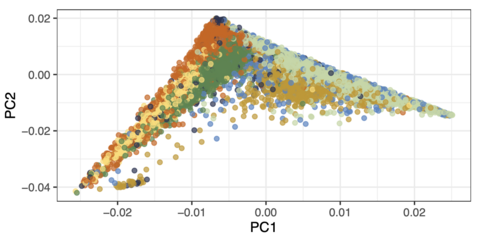
This review paper summarizes the genetic research contributions of the Hispanic Community Health Study/Study of Latinos (HCHS/SOL). HCHS/SOL is a landmark study that has provided crucial insights into the genetics of various health outcomes in Hispanic/Latino individuals. Due to the historically low representation of individuals with diverse race/ethnicities and ancestries in biomedical research, HCHS/SOL was established to ensure a diverse cohort, including, individuals were sampled in a way that ensured representation of Hispanic/Latino individuals with diverse Hispanic backgrounds (e.g. Mexican, Cuban, etc.).
One of the key achievements of the study is the extensive genotyping and imputation of HCHS/SOL participants. Researchers genotyped participants using different arrays and imputation panels, including the 1000 Genomes and TOPMed reference panels. HCHS/SOL researchers have published over 75 research articles addressing genetic risk, methodology, bioethics, diversity, and inclusion. The manuscript explores various methodologies employed in genetic research, such as, addressing population stratification, admixture mapping, the use of polygenic risk scores, and fine mapping.
The manuscript highlights the importance of considering ethical, legal, and social implications in genetic studies, particularly in diverse populations. HCHS/SOL data is available through dbGaP, and researchers have discussed the importance of responsible data sharing and the need for clear guidelines on the use of population descriptors. The study has also contributed to the understanding of gene-environment interactions and the potential for precision medicine in admixed individuals. Overall, HCHS/SOL has been instrumental in advancing genetic research in Hispanic/Latino populations, promoting diversity and inclusion in genomics, and paving the way for personalized medicine approaches.
Summary prepared (and then edited) using NotebookLM. We also used this resources to prepare a podcast! see attached media.
